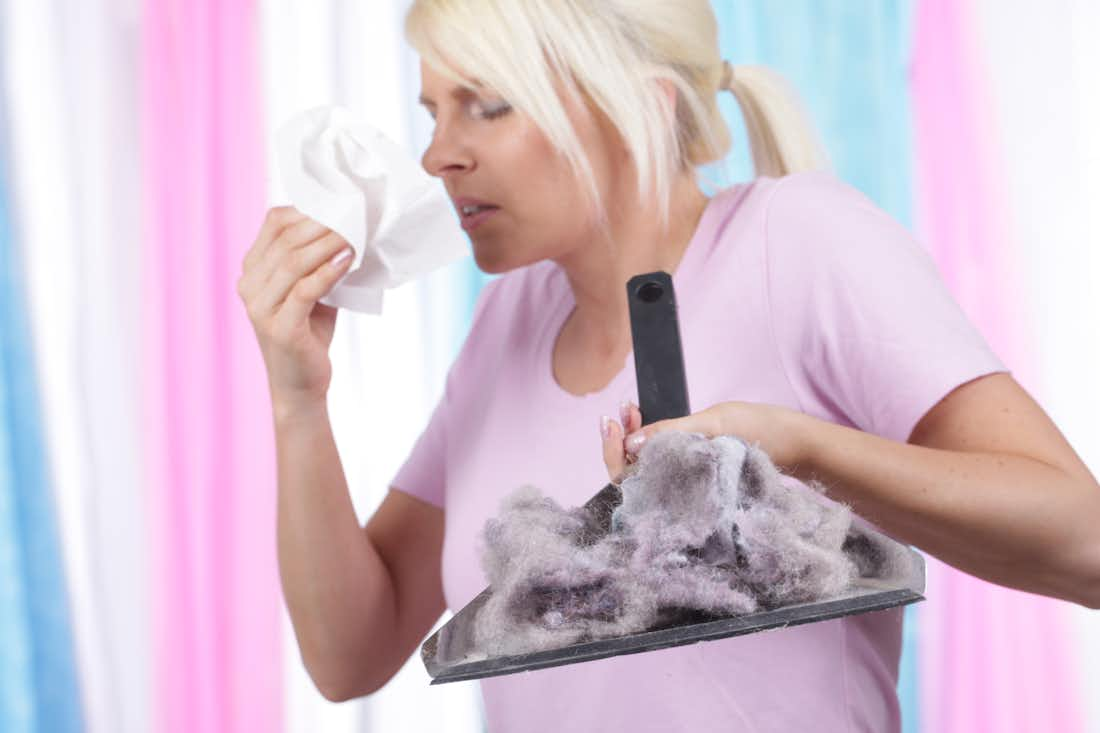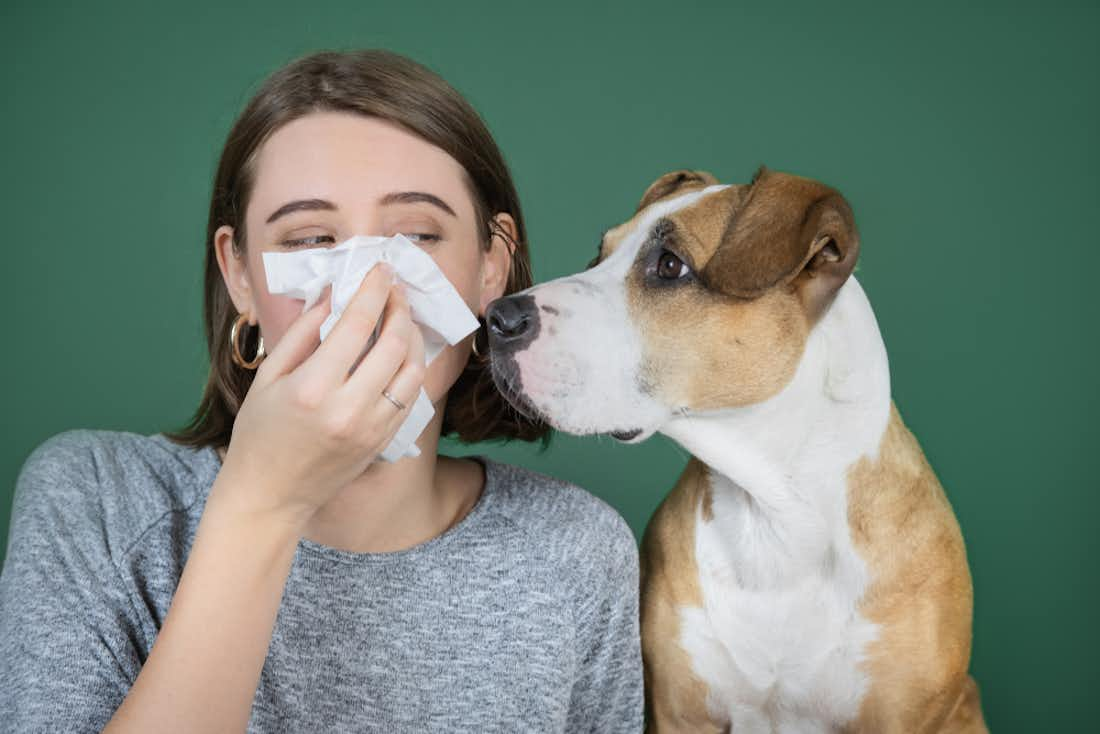Dec 1, 2021
Can Essential Oils Help with Allergies?
7 minute read
If you’ve ever had itchy allergy eyes or a stuffed-up nose from pesky pollen, then you know what it’s like to exhaust your arsenal of tools to feel relief. And we’re confident that one of those tools was a few stiff drops of your favorite essential oil into that diffuser.
Legend has it that essential oils are a great way to help alleviate allergy symptoms. And while we think essential oils have a great number of benefits, there might be a reason why your congested allergy nose doesn’t clear up as the scent of lavender fills the air.
Let’s find out how effective essential oils really are at dealing with allergy symptoms. Plus, we’ll talk about alternatives that might be better, as well as how you can use essential oils to your benefit.
What Are Essential Oils?
Essential oils had their moment in the early 2010s, and they really haven’t stopped existing at the forefront of self-care. Essential oils are compounds extracted from plants that capture the plant’s scent.
Using essential oil is known as aromatherapy, and it’s believed that inhaling the scents of these compounds can have various health effects. One of the proclaimed benefits of aromatherapy is alleviating allergy symptoms like a stuffy nose, sore throat, cough, and itchy eyes.
Not-So-Essential Oils
Here’s the tricky thing about essential oils, it’s hard to say whether or not they’re effective because there just isn’t enough research to suggest that they do. While lab results are usually promising, there isn’t enough evidence in human studies to say that essential oils help reduce allergy symptoms or other ailments.
With that said, there is anecdotal evidence to suggest that essential oils can be an effective way to improve allergy symptoms.
Here’s our bottom line: there’s nothing wrong with using essential oils as a supplementary remedy to your allergies.
As you’ll soon learn, there are many benefits that essential oils can have on your health. However, they should not be the primary treatment for your allergies. Many more effective and scientifically backed remedies should be your primary offense against the allergy enemy.
Your First Line of Defense
Before you whip out the purifier and load up on your citrus and lavender drops, there are some more effective methods for alleviating your allergy symptoms that you should try out first.
Antihistamines
When you feel the sneezing and headaches coming on, you can find relief fast with medications called antihistamines. When your immune system is confronted with an allergen, it releases chemicals called histamines. These cause your symptoms like runny nose, congestion, watery eyes, and all of those other frustrating feelings.
Antihistamines work by blocking the production of histamines, which can help reduce the severity of your symptoms. Oral antihistamines are common and are typically taken in pill form, but nasal sprays can help alleviate congestion specifically, and eye drops can target itchy eyes.
But if you’ve ever gone to the allergy section of your local drugstore, you were probably stunned to see the number of digits on the price tag for these meds. At Cleared, it’s our mission to bring relief at a price that’s accessible and fair. That’s why we offer generic brand antihistamines at just a fraction of the cost of the name brands.
Immunotherapy
Antihistamines are great for bringing you fast relief, but they only help alleviate the symptoms, not the underlying causes. If you finally want to be allergy-free, we might have the solution for you.
Allergy immunotherapy (AIT) is an allergy treatment that works by gradually exposing you to your allergen over time. By exposing your body to tiny amounts gradually, you start to build up immunity. It’s like eating a bite of food you hate every day until it soon becomes your favorite.
Sublingual immunotherapy is a form of AIT that involves nothing more than a tablet under your tongue. And the best part is that it’s FDA-approved and insanely effective. Just ask the 90 percent of people who reported improvement in general health status after using AIT.
Sound right for you? It probably is. Take our free 5-minute quiz and get started on the path towards an allergy-free life.
Avoidance
In addition to antihistamines or allergy immunotherapy, one of the best ways to help with your symptoms is to avoid what’s causing them in the first place.
For food allergies, it’s usually just as simple as staying away from any ingredients that cause you to react. But for seasonal or environmental allergies, it can be a little bit more tricky.
If you notice that your symptoms worsen when you go outside, it might be a pollen allergy. You can stay more comfortable by not going outside on windy and dry days, as these are typically when pollen counts are highest. Also, wear glasses to protect your eyes and a hat to keep pollen out of your hair.
If your symptoms are worse indoors, mighty dust mites might be the culprit. Be sure to wash your linens frequently and use a drier rather than hanging them outside, so they don’t pick up pollen.
The first step towards avoidance is understanding what’s causing your symptoms. To clear the air (literally), our at-home allergy test can scan for 40 common indoor and outdoor allergies,in so you know exactly what you need to avoid.
Allergy Relieving Remedies
While essential oils might not be the greatest remedy in the world for alleviating your allergies, they can still be very effective at managing other aspects of your health. So don’t toss your tinctures just yet.
De-Stress To Feel Best
One of the main reasons that people use essential oils in the first place is because they’re helpful for soothing tension and alleviating stress. One study found that using aromatherapy can improve performance at work by reducing stress and increasing attentiveness.
This can have indirect benefits if you struggle with allergies, as the persisting symptoms can definitely bring you some stress. Sneezing, coughing, and stuffy noses all day long are enough to make anyone feel miserable, and aromatherapy may be able to fix that to an extent.
While many essential oils help combat stress and improve mood, lavender oil is specifically touted as the best. In fact, lavender was once used as a cleaner in hospitals when antiseptics hadn’t yet been discovered.
Ain’t That Swell
Got some sore muscles from exercise, or are your joints tender from a fender bender? If so, essential oils might be able to bring you some relief. One study has found that tea tree oil specifically can help to soothe irritations.
You can put some tea tree oil into a diffuser for the aromatherapeutic benefits. Still, you can also apply small amounts directly to your skin to try to clear up blemishes and bring some topical relief to your joints. Not to mention, you can even put a few drops into your morning or nightly tea!
Improving Sleep Health
Allergy symptoms like congestion and watery eyes can make it more difficult to fall asleep and stay asleep. And while essential oils might not be able to help with those symptoms, they may be able to help you find more comfort as you drift away into peaceful dreams.
Some essential oils are great for sleep, such as bergamot, which may lower blood pressure. One study even found that it improved sleep in 64 percent of individuals who used it.
Essential Information
Essential oils and aromatherapy have their fair share of benefits. They can help to ease stress, bring down the negative effects of joint pain and swelling, and even help you catch some sleep. But they probably won’t be able to help bring any relief to your allergy symptoms.
In addition, some people with allergies are sensitive to smells and chemicals and essential oils may actually make their symptoms worse.
Things like antihistamines, immunotherapy, and avoidance are much more effective and clinically proven. While these should be your first line of defense, there’s nothing wrong with using essential oils as a supplementary remedy to help with certain indirect allergy symptoms like poor sleep and bad mood.
If your essential oils just aren’t cutting it and you need a different form of relief, your online allergist is in.
Reviewed by Dr. Payel Gupta
Sources:
Aromatherapy: Do Essential Oils Really Work? | John Hopkins Medicine
Aromatherapy Improves Work Performance Through Balancing the Autonomic Nervous System | NIH
Experiences of aromatherapy massage | NIH among adult female cancer patients: A qualitative study
Essential Oils 101: Do They Work + How Do You Use Them? | Cleveland Clinic
The use of aromasticks to help with sleep problems: A patient experience survey | NIH



